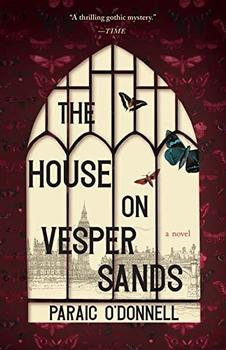Summary | Excerpt | Reading Guide | Reviews | Beyond the Book | Readalikes | Genres & Themes | Author Bio

"Heaven help us, Miss Tull. It seems a resident of Southwark was found devoured by his own cats. What has the world come to, that such things can happen not three miles from us?"
He continued tutting and clucking as he let himself out, and when at last he locked the door behind him Esther released a long quiet breath. She allowed herself to slump a little, now that she was no longer observed, and to loosen her clothing where it pressed against the injured place. She had imagined this moment many times, fearing always that her courage would fail at the last. She had prayed, though she knew the wickedness of doing so. The Lord could not be called upon by those who had chosen her course.
Yet the strength had come. It held now even as her posture slackened, like a wire that had been drawn taut at her core. She had saved the drug until the last possible moment, being unused to its effects. She had done the stitching without it, fearing it would leave her insensible, only binding her jaw with a leather strap to keep herself from screaming. The relief, when it came, had made her weep. The opium had done its work, but she had endured the worst without it. Whatever strength she had found had some other source.
When it was done, she had swabbed the stitches with a solution of carbolic acid, then examined her work in the looking glass. The words had appeared backwards, and she was not confident in her letters on the best of days. But she had taken her time over it, meaning to be sure. There was a small satisfaction in that, and in preserving the neatness of her work even at the height of her agony. She had taken a fleeting pride in her efforts, but had seen that in the next moment for the sin that it was. She had turned away from the glass to dress, lest she make herself late.
Esther roused herself. She had much to do still, and the danger had not passed. From a pocket sewn to the inner part of her petticoat—this was the first of the alterations she had made—she drew out a wad of ragged gauze that she had soaked in spirits. Reaching beneath her clothing, she dabbed at the skin around the stitches. She did so without looking, since she could not risk unclothing herself further, and kept one hand clamped to her mouth in case a sound should escape her. She withdrew the swab at intervals to examine it, refolding it and readying a clean patch once a portion was saturated. It was not that she feared for the cleanliness of the wounds—with that, at least, she need not trouble herself—but she was anxious that the stitches might be too much obscured by blood. They must be plainly visible, or nearly so, or her efforts would be wasted. It was a small part of her plan, and might have been done without if she had only one purpose, but it was not only a matter of saving those who could still be saved. She had made a promise and meant to keep it. For a little longer she must conceal her purpose, then the moment would come. She would bear witness, in the end, whatever might become of her soul.
She stooped to unlace her shoes, wincing as she worked them off. The pain had sharpened, but she refused to give it her attention. These were the moments that mattered most. She must be quick and exact in every movement, and above all she must be silent.
Esther kept to the edges of the room, where the boards under her stockinged feet had less give. Her father had taught her that, many years ago, and a good deal else. She remembered him fondly enough, for all his wickedness. Reaching the strongbox, she paused to listen, just as he would have done.
Stealing is half waiting, girl. His face was long gone, but she could still raise his voice. Stealing is half waiting, and the other half is listening.
A minute passed, maybe longer. Mr. Carew coughed once, but no other sound came. From a narrow pocket sewn into her cuff, she drew out the key. He had felt nothing when she took it from him. She had learned her skills at her father's side, in the low places of Spitalfields that she had known as a child. She had renounced them years before, but they came to her again without effort. She had learned an honest trade when her father was gone, but one that had kept her fingers nimble. She had not forgotten.
Excerpted from The House on Vesper Sands by Paraic O'Donnell. Copyright © 2021 by Paraic O'Donnell. Used with the permission of the publisher, Tin House. Copyright © 2020 by Paraic O'Donnell.




Anagrams
Click Here to find out who said this, as well as discovering other famous literary quotes!
Your guide toexceptional books
BookBrowse seeks out and recommends the best in contemporary fiction and nonfiction—books that not only engage and entertain but also deepen our understanding of ourselves and the world around us.